-
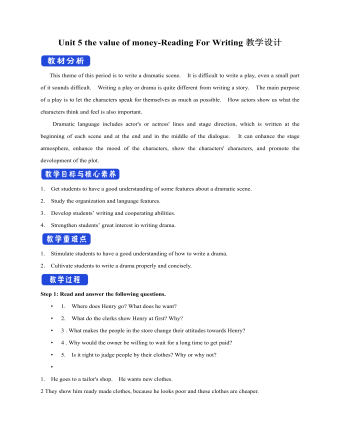
新人教版高中英语必修3Unit 5 the value of money-Reading For Writing教学设计一
【参考范文】Narrator:(Henry is smiling as he leaves the restaurant. As he is walking down the street, he sees a sign for a place that cuts hair. He decides to get it cut. )H=Henry;B=Barber;R=rude manH:Good afternoon, I'd like to get a cut, if I may. (The barber looks at Henry's hair and continues cutting another man's hair. )Er, I'd really like a haircut. As you can see it's much too long. B:(in a rude manner) Yes, I can see that. Indeed, I can. H:Fine, well I'll have a seat then. (He sits in one of the barber's chairs. The barber turns to look at Henry. )B:It's quite expensive here, you know!Are you sure you can afford it?H:Yes. I think so. (In comes the rude man. )R:Hey you there. I need a haircut quickly. Can you do me straightaway?B:All right, then, get in the chair and I'll see what I can do. R:Thank you. (sits down in one of the barber's chairs)H:Excuse me, but I was here first. Aren't you going to do my hair first?B:This man's in a hurry. H:Well so am I!I insist that you cut my hair first. B:OK, but I'll have to be quick. This gentleman is waiting. H:Thank you. (They both become quiet. After his hair is cut, the barber tells Henry how much he must pay. Henry shows the barber the bank note. )B:Why, Mr . . . (looks shocked)H:Adams. Henry Adams. I'm sorry, I don't have any change. R:You're that Mr Adams! Well,I'm glad I waited or I might never have known it was you. B:Why, Mr Adams, please don't worry!(wearing a big smile) Nothing to worry about!Nothing at all!Please come back any time, even if you only need too little hairs cut!It will be my honour to serve you!
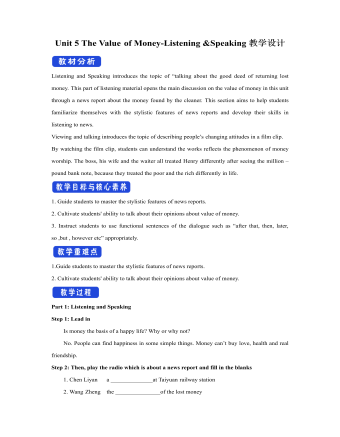
新人教版高中英语必修3Unit 5 The Value of Money-Listening &Speaking教学设计
Step 4: Listen again and decide if the following statements are true (T) or false (F).1 It was the first time Chen Liyan's story was reported. T口 F口2 Chen found 10,000 yuan in a small plastic bag in Taiyuan railway station口 F口3 Wang Zheng apologized to Chen because he couldn't offer her more money. T口 F口4 Chen took out a large loan to cure her daughter, T口 F口5 Wang set up a fundraising website for Chen's daughter after Chen told him about her situation. T口 F口Step 5:After listening, discuss the questions.1 What kind of person do you think Chen Liyan is?Chen Liyan is generous and honest because she returned a large sum of money to the owner.2 Did Chen return the money because she didn't need it?No. She returned the money because it was the right thing to do. Evidence for this is that she refused to accept the reward money because she felt that it had not been earned. 3 Is it common for people to do what Chen did?It depends on the culture. In some countries it is quite common to return money that has been found. In other countries, people believe "Finders are keepers!" 4 How did Wang Zheng feel about the return of his money?He must have been very happy and relieved to have gotten his money back. We know this because he thanked Chen repeatedly and even offered her a reward.5 Why did Ma Dongbao tell Wang about Chen's family?He must have had great sympathy for Chen and her daughter and wanted to help them.'We know this because he arranged help for them. 6 How did the news reporter feel about Chen's actions?The news reporter felt that it showed that money wasn't the most important thing in life. We know this because the reporter told us that this is what Chen believes. and then said, “that's a great attitude to take."
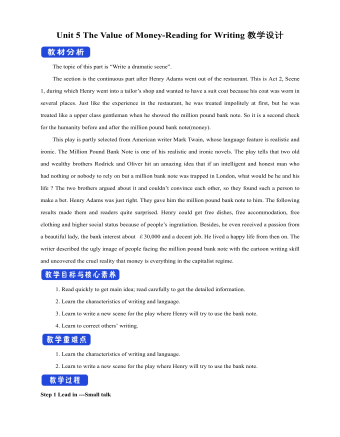
新人教版高中英语必修3Unit 5 The Value of Money-Reading for Writing教学设计二
2. 您能看到, 我头发太长了。You can see that my hair is much too long.3. 无论什么时候, 只要您想回来就回来。Please come back whenever you want.4. 您仅有很少的头发要理! You only have too little hair to cut !5. 为您服务是我的荣幸!It is my honour to serve you!Step 9 Writing(Henry is walking down the street when he sees a sign for a place that cuts hair. He decides to have it cut. )H=Henry B=BarberH: Good afternoon, I’d like to have my hair cut, if I may. (The barber looks at Henry’s hair and continues cutting another man’s hair. ) Er, I’d really like a haircut. As you can see it’s much too long. B: (in a rude manner) Yes, I can see that. Indeed, I can. H: Fine, well, I’ll have a seat then. (He sits in one of the barber’s chairs. The barber turns to look at Henry. )B: It’s quite expensive here, you know! Are you sure you can afford it?H: Yes. I think so. (After his hair is cut, the barber tells Henry how much he must pay. Henry shows the barber the bank note. )B: Why Mr. . . (looks shocked)H: Adams. Henry Adams. I’m sorry. I don’t have any change. B: Please don’t worry! (wearing a big smile) Nothing to worry about! Nothing at all! Please come back whenever you want, even if you only have too little hair to cut! It will be my honour to serve you!Step 10 Pair workExchange drafts with a partner. Use this checklist to help your partner revise his/her draft.1. Are all the elements of a play included and in good order ?2. Do the character use suitable language ?3. Are the stage directions clear and useful ?4. Is the plot clear and exciting enough ?
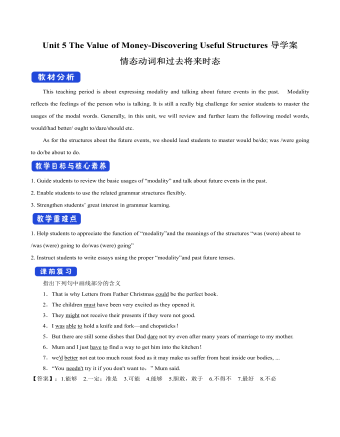
新人教版高中英语必修3Unit 5 The Value of Money-Discovering Useful Structures导学案
4.They were going to find someone to take part in their bet when they saw Henry walking on the street outside.[归纳]1.过去将来时的基本构成和用法过去将来时由“would+动词原形”构成,主要表示从过去某一时间来看将要发生的动作(尤其用于宾语从句中),还可以表示过去的动作习惯或倾向。Jeff knew he would be tired the next day.He promised that he would not open the letter until 2 o'clock.She said that she wouldn't do that again.2.表示过去将来时的其他表达法(1)was/were going to+动词原形:该结构有两个主要用法,一是表示过去的打算,二是表示在过去看来有迹象表明将要发生某事。I thought it was going to rain.(2)was/were to+动词原形:主要表示过去按计划或安排要做的事情。She said she was to get married next month.(3)was/were about to+动词原形:表示在过去看来即将要发生的动作,由于本身已含有“即将”的意味,所以不再与表示具体的将来时间状语连用。I was about to go to bed when the phone rang.(4)was/were+现在分词:表示在过去看来即将发生的动作,通常可用于该结构中的动词是come,go,leave,arrive,begin,start,stop,close,open,die,join,borrow,buy等瞬间动词。Jack said he was leaving tomorrow.
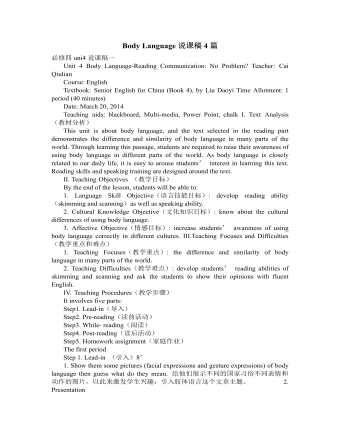
人教版高中英语必修4Body Language说课稿4篇
Textbook: Senior English for China (Book 4), by Liu Daoyi Time Allotment: 1 period (40 minutes)Date: March 20, 2014Teaching aids: blackboard, Multi-media, Power Point, chalk I. Text Analysis (教材分析)This unit is about body language, and the text selected in the reading part demonstrates the difference and similarity of body language in many parts of the world. Through learning this passage, students are required to raise their awareness of using body language in different parts of the world. As body language is closely related to our daily life, it is easy to arouse students’ interest in learning this text. Reading skills and speaking training are designed around the text.II. Teaching Objectives (教学目标)By the end of the lesson, students will be able to:1. Language Skill Objective(语言技能目标): develop reading ability (skimming and scanning)as well as speaking ability.2. Cultural Knowledge Objective(文化知识目标): know about the cultural differences of using body language.3. Affective Objective(情感目标): increase students’ awareness of using body language correctly in different cultures. III.Teaching Focuses and Difficulties(教学重点和难点)1. Teaching Focuses(教学重点): the difference and similarity of body language in many parts of the world.2. Teaching Difficulties(教学难点): develop students’ reading abilities of skimming and scanning and ask the students to show their opinions with fluent English.
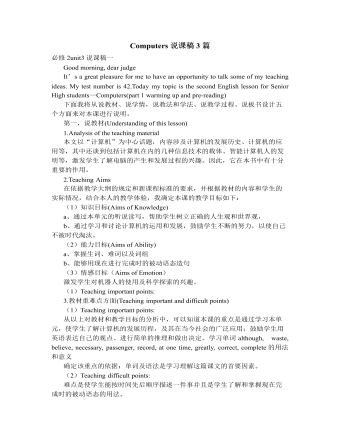
人教版高中英语必修2Computers说课稿3篇
一. 教材分析1. 本单元的中心话题是“计算机(Computers)”,内容涉及计算机的发展历史,计算机的应用等。本节课是该单元的第一课时,我将Warming up, Pre-reading and Comprehending这四部分整合为一节精读课。其中。Reading部分是题为WHO AM I?的文章,以第一人称的拟人手法介绍了计算机发长演变的历史和计算机在各个领域的应用,其主旨是表达计算机的发展变化之快以及在生活中用途之广。而Warming up部分以图片的形式展现了计算机的发展历程;Pre-reading中的问题和排序分别是为了预测语篇的内容和测试学生对计算机历史了解的情况;Comprehending则通过各项练习训练学生的阅读技能,从而加深对文章的理解。可见这几部分是一个有机的整体。2. 教学目标:1) 语言目标:重点词汇及短语:abacus, calculate, calculator, PC, laptop, PDA, robot, analytical, technological, universal, mathematical, artificial, intelligent, network, explore, in common, as a result.重点句子:a. My real father was Alan Turing, who in 1963 wrote a book to describe how computers could be made to work, and build a “universal machine” to solve any mathematical problem.
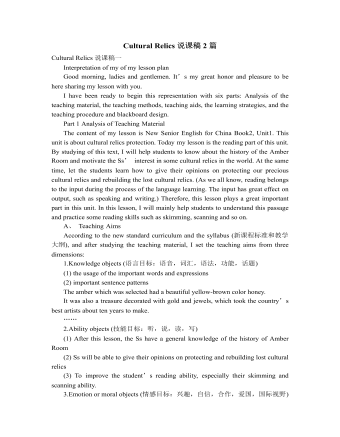
人教版高中英语必修2Cultural Relics说课稿2篇
Ⅲ. Analysis of the teaching material:The topic of this unit is cultural relics. Students are quite interested in topics about different cultures around the world. This is the second period of the whole unit. As a reading class, the passage mainly talks about the history of the amber room (how it was made, sent as a gift, lost and rebuilt).According to the new national curriculum, when teaching reading, much emphasis should be put on training the students’ reading skills.Ⅳ. Teaching objectives1. Language objectives:1) Students are required to master the key words and phrases occurred in the passage (e.g. amazing, decorate, belong, in return, less than etc.)2) Students are required to learn the attributive clause and acquire the sentence pattern.2. 1) Students are required to describe a certain thing by using the new sentence patterns.2) Students are required to master two kinds of reading skills—skimming and scanning, and learn to use them in their daily reading.3. 1) Students are required to know the history of the amber room.2) Students are required to appreciate cultural relics and understand the importance of protecting them.Ⅴ. Teaching important and difficult points1) the new words, phrases, and sentence pattern in the course of reading.2) Teaching difficult point: Help the students master two kinds of reading skills—skimmingand scanning and learn to apply them in daily use.Ⅵ. Teaching methods:Task-based method & Top-down model Ⅶ. Teaching aids: PPT, pictures, blackboard Ⅷ. Teaching procedure:
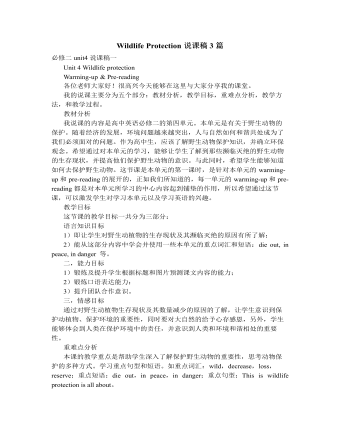
人教版高中英语必修2Wildlife Protection说课稿3篇
When it comes to the students’ studying methods, I'd like to introduce my Ss first. The Ss have a good command of basic language points. They’re interested in learning English, and they take an active part in English class, so they will have fun in autonomous, cooperative and inquiry learning. I will just serve as a guide, showing them the way to explore how to make more progress in their English learning.Now it’s time for the most important stage of this lesson. My teaching procedures are arranged as follows:Step1.Leading-in (3 minute)Play a video of a wide variety of wildlife to introduce my topic. Step2. Speaking (12 minutes)We will use our textbook Page25. Let the Ss fast read the short paragraph to warm up. Ask them to talk about the report on some endangered wildlife in China with the dialogue patterns on the screen. Lastly, I will invite some groups to demonstrate their dialogues about saving wildlife in China.Step3.English play (3 minutes)Watch another video in praise of their excellent performance just now. It’s about Jack Chen’s(成龙)and Yang Ziqiong’s wildlife protection.Step4. Listening (twice 13 minutes)This time, I’ll ask the Ss to fill in the blanks of the monologue of the 2 movie stars above. Step5.Discussion (3 minutes)Which would you like to choose to wear, clothes made of cotton, artificial leather or animal skins? Why ?Step6. Summary (3 minutes)1. If there were no wildlife, there wouldn’t exist human beings. If the buying stops, the killing can, too.2. Animals are our friends. To love animals is to love ourselves. Stop hunting, killing and destroying wildlife.3. Let’s live in harmony with all the living things in the world. Step7. Music appreciation (3 minutes)Let the Ss appreciate the song Earth Song by Michael Jackson. Last but not the least, I will show you my blackboard design.
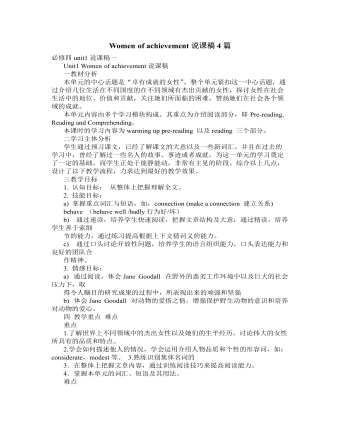
人教版高中英语必修4Women of achievement说课稿4篇
Good morning, distinguished judges:It’s my honor to talk about my teaching ideas with you. Today my topic is Women of Achievement. My presentation consists of six parts: the analysis of teaching material and student, teaching aims, key and difficult points, teaching and studying method, teaching procedures and blackboard design.First, let’s focus on the analysis of teaching material. This lesson is from New Senior English for China Student’s Book 4 Unit 1, the reading part. The main topic of the passage is the introduction of a student of Africanwildlife. After this lesson, the students will learn more information about her studying chimps in Africa, and their reading and speaking abilities can be developed as well.The next part is the analysis of students. My students are in senior high students. They have learnt English for many years, they’ve known many words and sentences, but their speaking and reading abilities are still not very good. So I will practice their speaking and reading abilities through different exercises.According to the New Standard Curriculum and the present situation, I set the teaching aims as follows: firstly, knowledge aims. Students can grasp some new words, such as worthwhile, move off. Moreover, students can understand the content of the passage and get familiar with the topic of studying chimps in wildlife. Secondly, ability aims. Students can use reading strategies such as skimming and scanning in reading process. Thirdly, emotional aims. Students can have the awareness of protecting animals and care about animals.Based on the above analysis, the key point of this lesson is to get the main idea and the detailed information from the passage; the difficult point is to talk about the wildlife protection and use reading strategies.
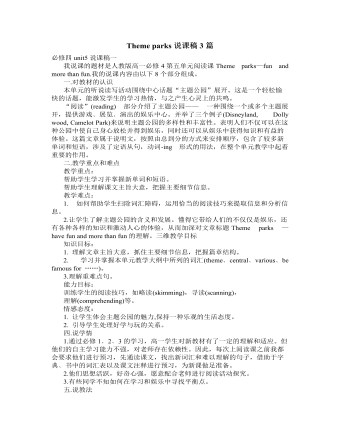
人教版高中英语必修4Theme parks说课稿3篇
The oldest and the most popular park in the worldenjoy the exciting activities thereget close to the life-size cartoon characters like Mickey Mouse and Donald Duck Step 3 Pre-reading1.What do you suppose a theme park is ?2.What do you think you can see in a theme park?(1.It is a kind of amusement park which has a certain theme – that the whole park is based on. 2.buildings, castles, statues, rare animals and birds, and so on.) Step 4 Reading ----- Theme Parks –---- Fun and More Than Fun1.Predict : Read the title and the pictures on P. 34 and PredictWhat is the meaning of the title “Theme Park – Fun and more than fun”?(The title means that theme parks are fun to visit, but that they can also be educational and can offer useful information.)2.Skimming Fast read and answer:What activities can we take in a theme park?Amusement park: Bumper car Merry-go-round slide bungee jumping Free-fall rides Horror films Pirate ship Ferris wheel roller coaster3.Scanning Read again and you will find various theme parks are mentioned in the passage . Then what are they ?Theme parks: Sports theme park History theme park Culture theme park Marine or Ocean theme Park Future park Science theme park Disneyland4.Careful reading and find the main idea of each paragraph:THEME PARKS---- entertaining/ educationalPara.1 Traditional parks are places to go for relaxation and to have time away from our busy lives.Para.2 Theme parks are different They’re large and full of things to do, see and buy.Para.3 Theme parks are built around a single idea or theme. One example is a sports park.Para.4 Another kind of theme park is historical more and cultural and can be educational.Para.5 Disneylandwas the first theme park. It is based on the fantasy life and characters of Disney’s films.Para.6 Some examples of educational theme parks include sea world parks and science parks.
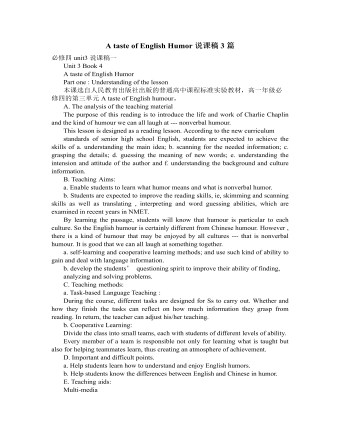
人教版高中英语必修4A taste of English Humor说课稿3篇
Then I would ask them to think of a funny English or Chinese and tell it to partners. While telling stories, they can use expressions and some acting to help make the story funny. 5 minutes would be given to do this.Those stories they told there will be the material for their writing. Soletting them tell it at first is helpful. And they can make a difference between telling a funny story and writing it down. Generally speaking, it is difficult forstudents to write well because they don’t know what to write and how to write. Asking them to tell their own stories at first can help them come up with what to write.After their telling, I would invite someone to share his/her story with all of us and I would write it down on the blackboard.This example story would be used as a sample to illustrate the format of funny story. Different from a story from teacher or textbook, a story from students can obviously become a interesting material to draw students’ attention.Then I would ask the whole class to put this story into several parts. It might be a little bit difficult for them. So I would ask them to find out whether all the sentences are necessary. After delete some sentences, there are 6 sentences left behind. Then they can easily put them into three parts. After interaction with students, I would teach them the right terms for each part and conclude the format of funny story.This step is the key and difficult point in my lesson. So I mainly usetask-based teaching method in this part and the task for students was divided into several stages. With the separated difficult level, students can find there are usually three parts in writing. They can also learn to write without the unnecessary parts in the process of analyzing. And then I wouldn’t rush to tell them the right terms to them directly. Instead, I would ask them to name them by their own. A confused mind is better for acquiring knowledge.While-writing:Then I would give students 7 minutes to write down this story, without other requirements.With all the preparations in pre-writing, students’ difficulties were cleared. So it would be much easier for them to write down the story within 7 minutes. There are no other requirements because students’ first writing is actually a drafting. It would be revise and edit several times later. Writing, as a skill
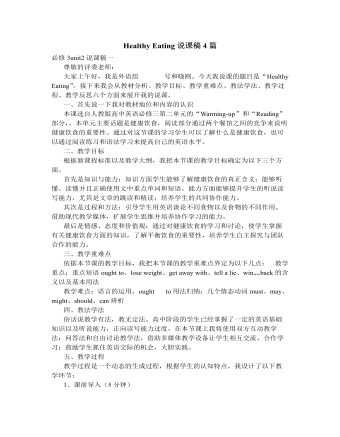
人教版高中英语必修3Healthy Eating说课稿4篇
Language learning needs a context, which can help the learners to understand the language and then can product comprehensible output, so computer has the advantages to make the materials attractive.Part 3 Learning MethodsTask-based, self-dependent and cooperative learningPart 4 Teaching ProcedureStep One Lead-in“Interest is the best teacher.” Therefore, at the very beginning of the class, I should spark the students’ mind to focus on the centre topic “the band”. I’ll show some pictures of food to attract their attention and then bring some questions.Question:What kind of food they like?What should go into a good meal?The answers must relate to the diet. After this, the students will be eager to know something about a balance diet and this is the very time to naturally lead the class into Step 2Step 2 Reading for information: skimming and scanning In this step, I use Task-based Language Teaching method, which can give students a clear and specific purpose while skimming and scanning the context.Task 1 General ideaThe students will be asked to just glance at the title and the pictures of the passage, and then guess what they will read in the text. And they’ll be divided into groups of four to have a discussion.The purpose is to inspire the students to read actively, not passively. In addition, the task is to develop the students’ reading skill by making prediction and to encourage the students to express their thoughts in English and cooperate with each other.Task 2 Main idea of each paragraphCooperative learning can raise the students’ interest and create an atmosphere of achievement. Based on this theory, I divide the whole class into 4 groups to skim the whole text and get the main idea of each paragraph.
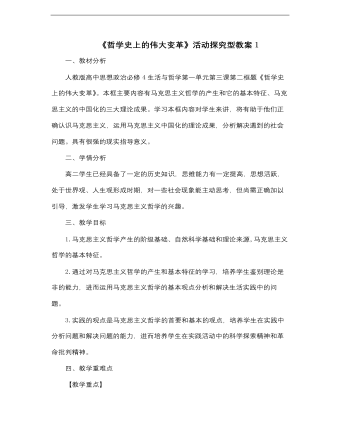
高中思想政治人教版必修四《哲学史上的伟大变革活动探究型》教案
一、教材分析人教版高中思想政治必修4生活与哲学第一单元第三课第二框题《哲学史上的伟大变革》。本框主要内容有马克思主义哲学的产生和它的基本特征、马克思主义的中国化的三大理论成果。学习本框内容对学生来讲,将有助于他们正确认识马克思主义,运用马克思主义中国化的理论成果,分析解决遇到的社会问题。具有很强的现实指导意义。二、学情分析高二学生已经具备了一定的历史知识,思维能力有一定提高,思想活跃,处于世界观、人生观形成时期,对一些社会现象能主动思考,但尚需正确加以引导,激发学生学习马克思主义哲学的兴趣。三、教学目标1.马克思主义哲学产生的阶级基础、自然科学基础和理论来源,马克思主义哲学的基本特征。2.通过对马克思主义哲学的产生和基本特征的学习,培养学生鉴别理论是非的能力,进而运用马克思主义哲学的基本观点分析和解决生活实践中的问题。3.实践的观点是马克思主义哲学的首要和基本的观点,培养学生在实践中分析问题和解决问题的能力,进而培养学生在实践活动中的科学探索精神和革命批判精神。
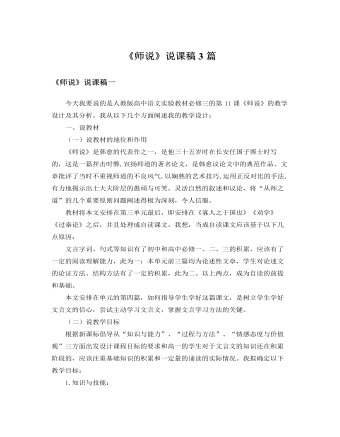
人教版高中语文必修3《师说》说课稿3篇
一、设计理念教学设计坚持少讲多学、以学为主的教学理念,重视学培养生的学习兴趣,要充分调动学生学习的积极性和主动性,充分发挥学生的主体性。教师要以组织者、引导者、合作者的角色参与到教学活动中去。力图通过导学案努力培养学生的自学习惯和自学能力。二、教材分析与处理1、教材的地位与作用:必修三第三单元所选的文言文都是古代的议论性散文。本课是“唐宋八大家”之首、中唐古文运动的倡导者韩愈的力作,是唐宋散文中的名篇,具有很强的代表性。通过这篇自读课的学习,能使学生了解唐宋散文的风貌,更能使学生进一步积累文言文基础知识,提高学生的文言文阅读欣赏能力,从而提升学生的文言文自读能力。2、教学目标:《高中语文课程标准》要求高中学生能阅读浅易文言文,能借助注释和工具书,理解词句含义,读懂文章内容;了解并梳理常见的文言实词、文言虚词、文言句式的意义或用法,注重在阅读实践中举一反三;对文章有一定的分析欣赏能力。高一的学生对于文言文的知识还在积累阶段,应该注重基础知识的积累和一定量的诵读。对此,我将教学目标确定为:
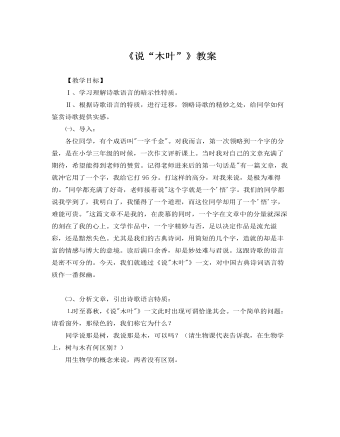
人教版高中语文必修5《说“木叶”》教案
【教学目标】Ⅰ、学习理解诗歌语言的暗示性特质。Ⅱ、根据诗歌语言的特质,进行迁移,领略诗歌的精妙之处,给同学如何鉴赏诗歌提供实感。㈠、导入:各位同学,有个成语叫"一字千金"。对我而言,第一次领略到一个字的分量,是在小学三年级的时候,一次作文评析课上。当时我对自己的文章充满了期待,希望能得到老师的赞赏。记得老师进来后的第一句话是"有一篇文章,我就冲它用了一个字,我给它打95分。打这样的高分,对我来说,是极为难得的。"同学都充满了好奇,老师接着说"这个字就是一个'悟'字。我们的同学都说我学到了,我明白了,我懂得了一个道理,而这位同学却用了一个'悟'字,难能可贵。"这篇文章不是我的,在羡慕的同时,一个字在文章中的分量就深深的刻在了我的心上。文学作品中,一个字精妙与否,足以决定作品是流光溢彩,还是黯然失色。尤其是我们的古典诗词,用简短的几个字,造就的却是丰富的情感与博大的意境。读后满口余香,却是妙处难与君说。这跟诗歌的语言是密不可分的。今天,我们就通过《说"木叶"》一文,对中国古典诗词语言特质作一番探幽。
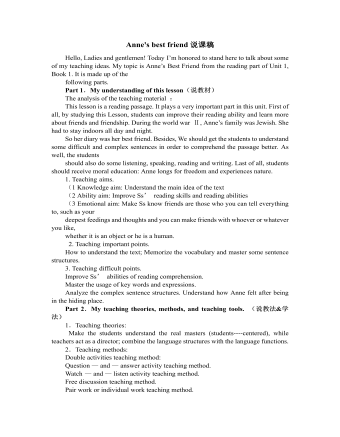
人教版高中英语必修1Anne's best friend说课稿
Step 7 Language points 1.Vocabulary (1) go through (2) set down (3) a series of (4) on purpose (5) in order to (6)at dusk (7)entirely (8)face to face 2.Important sentences (1)…I’ve grown so crazy about everything to do with nature. (2)There was a time when … (3)I stayed awake on purpose until … (4)It was the first time … that I’d seen the night … (5)It’s no pleasure looking through … Purpose: 1.Master the required vocabulary and sentence structures. 2.Use them freely. Step 8 Consolidation 1.Find out the topic sentences 2.Retell the text according to the topic sentences Purpose: I want to know if my students understand the text. Step 9 Discussion Imagine you have to go into hiding like Anne and her family, what would you miss most? Giveyour reasons. Purpose: Train Ss’ oral English ability. Step 10 Homework Write an article on Friends. Purpose: 1. Improve the Ss’ writing ability. 2 Train the Ss’ ability of self—teaching and looking up information by themselves. Part 5 Blackboard design(说板书设计)Unit 1 Friendship Reading Anne’s Best Friend 1.Main idea of each paragraph: Para. 1 Anne made her diary her best friend. Para .2 Anne wrote her feelings in her diary. Para .3 Anne missed nature. Para.4 Anne saw the night face to face Para.5 Anne wanted to experience nature outdoors. 2.Listening: Exx.1 P3 3.Discussion: Exx.3 P3 Purpose: 1.Make Ss familiar with the passage 2.Make the design inductive, instructive and artistic.
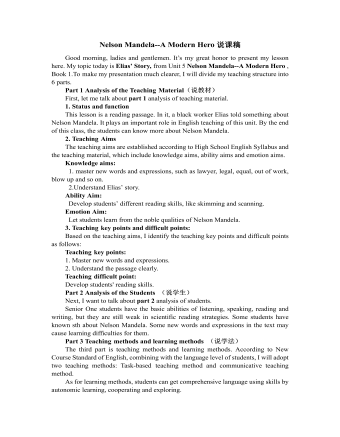
人教版高中英语必修1Nelson Mandela--A Modern Hero说课稿
In this step, give students a few minutes to read the passage . While they are reading, I will write some key words of the text on the blackboard. Then ask students to retell the passage according to the key words.By retelling, students can improve their ability of language organization and have an overall understanding of the article.Step 4 Group discussionIn this step, students will be divided into groups of 4 to discussion the following question: What qualities make a great person?After their discussion, invite a few groups to make a report to the class.This group discussion can practice students’ oral English and cultivate their abilities of cooperation and communication.Step 5. HomeworkLet students write a short passage to introduce a great person he or she admires.The homework can consolidate the knowledge the students have learned and cultivate their writing ability. Part 6 Blackboard Design(板书设计)That’s all my teaching procedures. Finally, I’d like to say sth about part 6 blackboard design. On the top is the title. On the left, there will be some new words and expressions. In the middle of the blackboard, I will write some useful sentence structures so that the students can know clearly what they’ve learned and then try to master the knowledge.OK. That’s all for my presentation. Thank you for your attention.
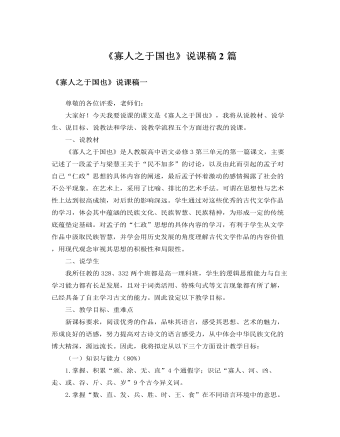
人教版高中语文必修3《寡人之于国也》说课稿2篇
(明确:“寡人之于国也,尽心焉耳矣”,但“寡人之民不加多,何也?”)②他认为自己对国家政务尽心尽力了,他有哪些具体做法?(明确:移民移粟)③第2—4节中孟子是怎样说明梁惠王移民移粟的措施与“邻国之政”并无本质区别的?(明确:孟子不直接回答“民不加多”的问题,而是用梁惠王熟悉的“战”设喻——设圈套,诱使对方在不知不觉中说出“不可,直不百步耳,是亦走也。”)④孟子认为怎样才能做到“王道之始”?要想“王道之成”还需采取哪些措施?(明确:“不违农时,谷不可胜食也。数罟不入氵夸池,鱼鳖不可胜食也。斧斤以时入山林,材木不可胜用也。谷与鱼鳖不可胜食,材木不可胜用五亩之宅,树之以桑,五十者可以衣帛矣。鸡豚狗彘之畜,无失其时,七十者可以食肉矣。百亩之田,勿夺其时,数口之家,可以无饥矣。谨库序之教,申之以孝涕之义,颁白者不负戴于道路矣。)这一小步的目的是想让学生通过这些问题的解答,可以进一步理清思路,掌握文的大概内容。
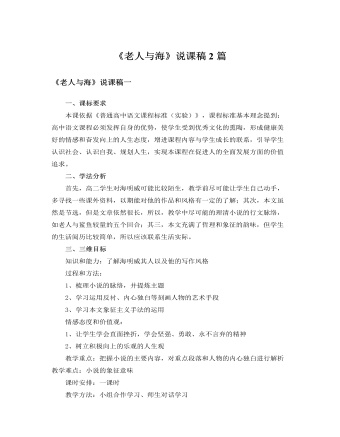
人教版高中语文必修3《老人与海》说课稿2篇
3、重要语句的理解“可是一个人并不是生来要给打败的,你尽可把它消灭掉,可就是打不败他。”解析:这是老人第一次回合之后的内心独白,也是此小说的核心精神,充分体现了老人桑地亚哥的生命理念。整句话可以分为两部分来理解,前句告诉我们,人生活在自然与社会当中,必不可少要面临一些坎坷、磨难,这些磨难、坎坷完全可以造成躯体的消灭、消亡,这是人生命的脆弱性。后句,面对挫折,只要保持一种乐观的精神,拥有一颗坚强的心灵,那么,人类执着奋斗的精神将永不磨灭。4、象征主义题目是《老人与海》,而表明上,小说是写一位老人及其在海上的经历,但实际上,老人的形象极具概括性,他已经超越了一个人的存在,而成为了人生的一种象征。老人桑地亚哥就是“硬汉子”的代表,大海则是生命旅途的象征,鲨鱼则是我们行走中的“强物”,厄运的象征。人的一生不可能一帆风顺,不经历风雨,怎能见彩虹,走在人生路途中,不可避免我们都要遇到挫折,被厄运所阻挠,只有经历与“鲨鱼”的较量,才能成为强者,唱出最美的歌。
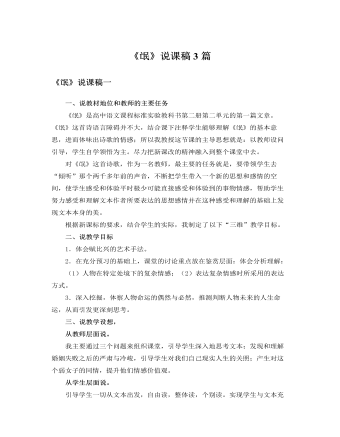
人教版高中语文必修2《氓》说课稿3篇
四、教学方法和学法。课前学生搜集有关《诗经》的资料必不可少。另外,时隔数千年,年代久远,文字的障碍很大,然而,过分纠缠于文字的疏通会破坏诗歌的“气”,丧失诗歌的“神”,所以在学习时,应舍去条分缕析的理论评价,指导学生结合注释疏通文字,然后引领他们经由文字再现形象和事件,经由形象和事件领略情感,感受其中浓浓的诗情。诵读的环节是重要的,配以二胡独奏《长相思》,营造意境,学生沉浸在音乐营造的意境中反复吟咏,读出节奏,读出音调,读出感情,细细体味,让或优或喜的情愫萦绕心间,我们就触到了先民的灵魂。比兴手法为《诗经》独创,重章叠句同样别致而新鲜,教学过程中结合具体语境让学生自己去发现并进行讨论,不搞枯燥的知识传授。还引入讲故事、改写两种活泼的学习形式,从而达到加深理解的目的。





















